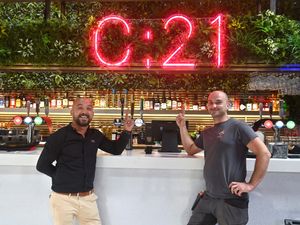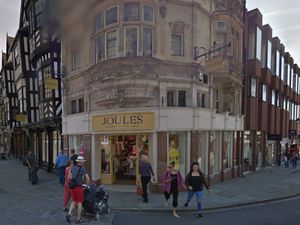Inspector told flats plans would harm Shrewsbury's conservation area
Plans to build two blocks of flats behind a former hotel would damage Shrewsbury’s conservation area and the setting of historic buildings, Shropshire Council has said.
The authority has defended its decision to refuse planning permission for the apartments to be built behind the former Lord Hill Hotel in Abbey Foregate, despite claims from the developer that the scheme would bring overall benefits.
Arguments for and against the proposals were aired at an appeal hearing at Shirehall before Government-appointed planning inspector William Cooper.
Around 10 neighbours who oppose the development also attended the hearing, along with SY Homes boss Wayne Sidell, who lodged the application.
The plans were refused last year on the grounds that the proposed buildings would cause harm, albeit “less than substantial harm”, to the conservation area and the setting of both the Lord Hill Hotel and the nearby Chaddeslode House, which are both Grade II listed.
Chaddeslode House has recently been converted into apartments, while SY Homes is currently converting the hotel into three houses.
The applicant’s heritage consultant Dr Jonathan Edis told the hearing both buildings had “relatively modest historical associations”.
He said: “They are, if you like, quite unassuming buildings that are part of the street scene.
“I think it’s probably fair to say that architecturally both buildings are relatively modest.
“They are not associated with top-flight architects, their architectural detail is relatively ordinary for buildings of their type. Their contribution to the local scene is what makes them special.”
Dr Edis said the application site currently contributes “very poorly” to the setting of the listed buildings, describing it as “a scene of complete dereliction”.
He said: “In recent times the buildings – the derelict buildings as they are now – on that site do nothing to contribute to, enhance or offer anything towards the significance of either of those listed buildings.”
Dr Edis argued the clearance of the site, including the demolition of Wrekin Lodge, a 24-bed accommodation block built in the 1980s, to construct two well-designed apartment blocks accompanied by an extensive landscaping scheme, would “enhance” setting of the former hotel and wider conservation area.
However this was not accepted by council planning officer Jane Raymond and conservation officer Karen Rolfe.
Ms Raymond said: “We disagree and conclude that the scheme as a whole results in ‘less than substantial’ harm.”
She said the council accepted the removal of some of the buildings would be positive, but added: “But if what you replace them with is not in keeping with the area that itself results in harm.
“In the council’s view the replacement is resulting in harm, and I would argue more so than the site as it exists as a hotel, with the small building behind and Wrekin Lodge at the bottom of the site. We don’t see the heritage benefits.”
Mr Cooper asked the appellant’s representatives what the public benefits of the scheme would be.
Carl Copestake, planning consultant from Knights, said the main benefit was the provision of 32 new flats, which would include six ‘affordable’ homes.
“It’s a previously developed site in a very good, sustainable location,” he said.
“In addition there are economic benefits – the construction jobs and the increased spend locally through future residents.”
However Ms Raymond responded: “That could be said of any site.
“Affordable housing is only at the policy-compliant level.
“The economic benefits and number of houses could be provided by an alternative scheme, so in our view there are no significant benefits that outweigh the harm.”
Residents who attended the hearing were also invited to have their say.
Alex Grant, a resident of Chaddeslode Gardens, said the scheme would impact him and his neighbours, as the proposed buildings are significantly larger than those currently on the site.
He said: “A lot of the discussion has rather ignored the setting of Chaddeslode House and the impacts on the residents of the house and adjacent properties within the gardens.”
Ms Raymond agreed, saying that while the proposed apartment buildings were further away from nearby houses, they were “significantly taller, visually dominant and would have an over-bearing impact”.
Further concerns were raised over odour issues from the proposed bin storage area, vehicle access.
Mr Grant added: “It is in no-one’s best interests for the site to remain unused.
“However there is a real concern on our side that in some respects the appellant doesn’t listen to views of either the council or our own views on the development of this site.”
The inspector, Mr Cooper, carried out a site visit following the hearing. His decision on the appeal will be published in the coming weeks.





